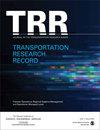Comparison of Discrete Choice and Machine Learning Models for Simultaneous Modeling of Mobility Tool Ownership in Agent-Based Travel Demand Models
IF 1.8
4区 工程技术
Q3 ENGINEERING, CIVIL
引用次数: 0
Abstract
Individual travel behavior, such as mode choice, is determined to a distinct degree by the respective portfolio of available mobility tools, such as the number of cars, public transit pass ownership, or a carsharing membership. However, the choice of different mobility tools is interdependent, and individuals weigh alternatives against each other. This process of parallel trade-offs is currently not reflected in typically used sequential logit models of agent-based travel demand models. This study fills this research gap by applying discrete choice and neural network models on a synthetic population to model multiple mobility tool ownership simultaneously. Using data from a national household travel survey, both model types approximated the given target distributions of mobility tools more accurately than the sequence of three corresponding logit models. Owing to its greater flexibility, the tested shallow and deep neural network exhibited higher predictive accuracy than simultaneous discrete choice models. The results indicated that neural networks with only one hidden layer were more robust and easier to formulate and interpret than deep networks with three hidden layers. Finally, the flat neural network was applied to a different synthetic population resulting in equally accurate results.基于agent的出行需求模型中机动工具所有权同时建模的离散选择模型与机器学习模型的比较
个人出行行为,如出行方式的选择,在一定程度上取决于各自可用的出行工具组合,如汽车数量、公共交通通行证所有权或汽车共享会员资格。然而,不同移动工具的选择是相互依赖的,个人会权衡各种选择。这种并行权衡的过程目前没有反映在通常使用的基于代理的旅行需求模型的顺序logit模型中。本研究将离散选择和神经网络模型应用于合成人群,同时对多种移动工具所有权进行建模,填补了这一研究空白。使用来自全国家庭旅行调查的数据,这两种模型都比三种相应的logit模型的序列更准确地近似于给定的流动性工具的目标分布。由于其更大的灵活性,测试的浅层和深层神经网络表现出比同时离散选择模型更高的预测精度。结果表明,与具有三个隐藏层的深度网络相比,只有一个隐藏层的神经网络具有更强的鲁棒性,并且更易于制定和解释。最后,将平面神经网络应用于不同的合成种群,得到同样准确的结果。
本文章由计算机程序翻译,如有差异,请以英文原文为准。
求助全文
约1分钟内获得全文
求助全文
来源期刊

Transportation Research Record
工程技术-工程:土木
CiteScore
3.20
自引率
11.80%
发文量
918
审稿时长
4.2 months
期刊介绍:
Transportation Research Record: Journal of the Transportation Research Board is one of the most cited and prolific transportation journals in the world, offering unparalleled depth and breadth in the coverage of transportation-related topics. The TRR publishes approximately 70 issues annually of outstanding, peer-reviewed papers presenting research findings in policy, planning, administration, economics and financing, operations, construction, design, maintenance, safety, and more, for all modes of transportation. This site provides electronic access to a full compilation of papers since the 1996 series.
 求助内容:
求助内容: 应助结果提醒方式:
应助结果提醒方式:


